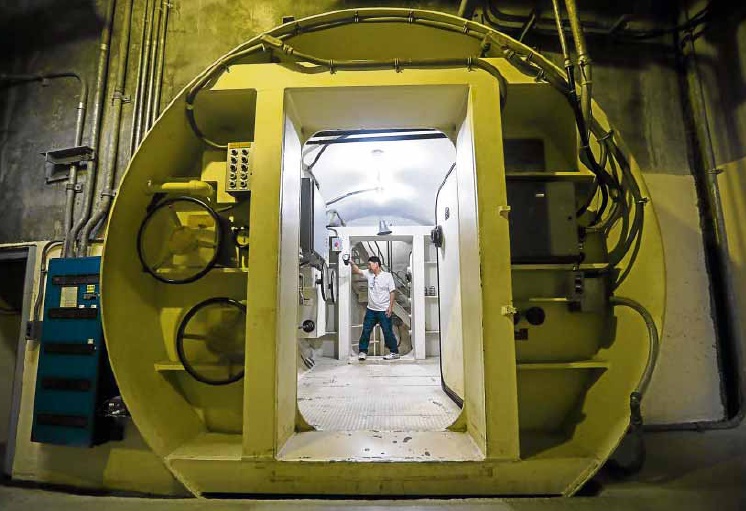
AIRTIGHT SECURITY The airlock doors leading to the containment building of the nuclear plant. The containment buildingcontains the reactor. LYN RILLON
The construction of the 620-megawatt Bataan Nuclear Power Plant (BNPP), which sits on a 357-hectare government reservation at Napot Point in Morong, Bataan province, began in 1975 and was completed in 1984.
Built at a cost of $2.3 billion, the BNPP was set for commercial operations in June 1985.
On April 30, 1986, then President Corazon Aquino ordered the project mothballed due to safety concerns and irregularities in funding. The BNPP was also built on a site considered geologically hazardous because it was identified as an earthquake-prone area.
In December 1988, the government charged Westinghouse Electric Co. and New Jersey company Burns and Roe with bribery, fraud and racketeering for conniving with former strongman President Ferdinand Marcos and his crony, Herminio Disini, in the construction of the power plant. READ: High court affirms cases vs Marcos crony Disini | Sandiganbayan orders Marcos crony to return $50-M loot in nuclear plant deal
In December 1992, then President Fidel Ramos rejected Westinghouse’s “final offer” to pay $100 million in cash and credits, upgrade the plant and operate it for 30 years for $40 million a year in exchange for the government dropping the bribery case.
Five months later, the Philippines lost in the bribery case as a New Jersey jury acquitted Westinghouse and Burns and Roe.
$100-million settlement
In October 1993, the Swiss Federal Supreme Court also threw out the government’s bribery suits against Burns and Roe, ruling that the country owes the US engineering firm about $1 million in damages and legal fees. Two months later, Ramos hinted that the government was open to another round of talks with Westinghouse.
In October 1995, Ramos inked a $100-million settlement with Westinghouse. The deal, however, meant that the government was still obliged to pay Westinghouse $300,000 in daily interest alone.
Since 1986, the government had spent a total of P64.7 billion—P43.5 billion for principal amortization and P21.2 billion in interest—for the nuclear plant that had yet to generate a single watt. It was only in 2007 when the country managed to fully pay its BNPP obligations.
The government, however, still spends P27 million a year for the upkeep of the plant.
In August this year, Energy Secretary Alfonso Cusi said the government was looking into the option of reviving the BNPP to meet the country’s energy needs. Cusi estimated that it would cost at least $1 billion to reopen the facility.
READ: Cusi defends nuke plant revival
Source: Inquirer Archives
TVJ